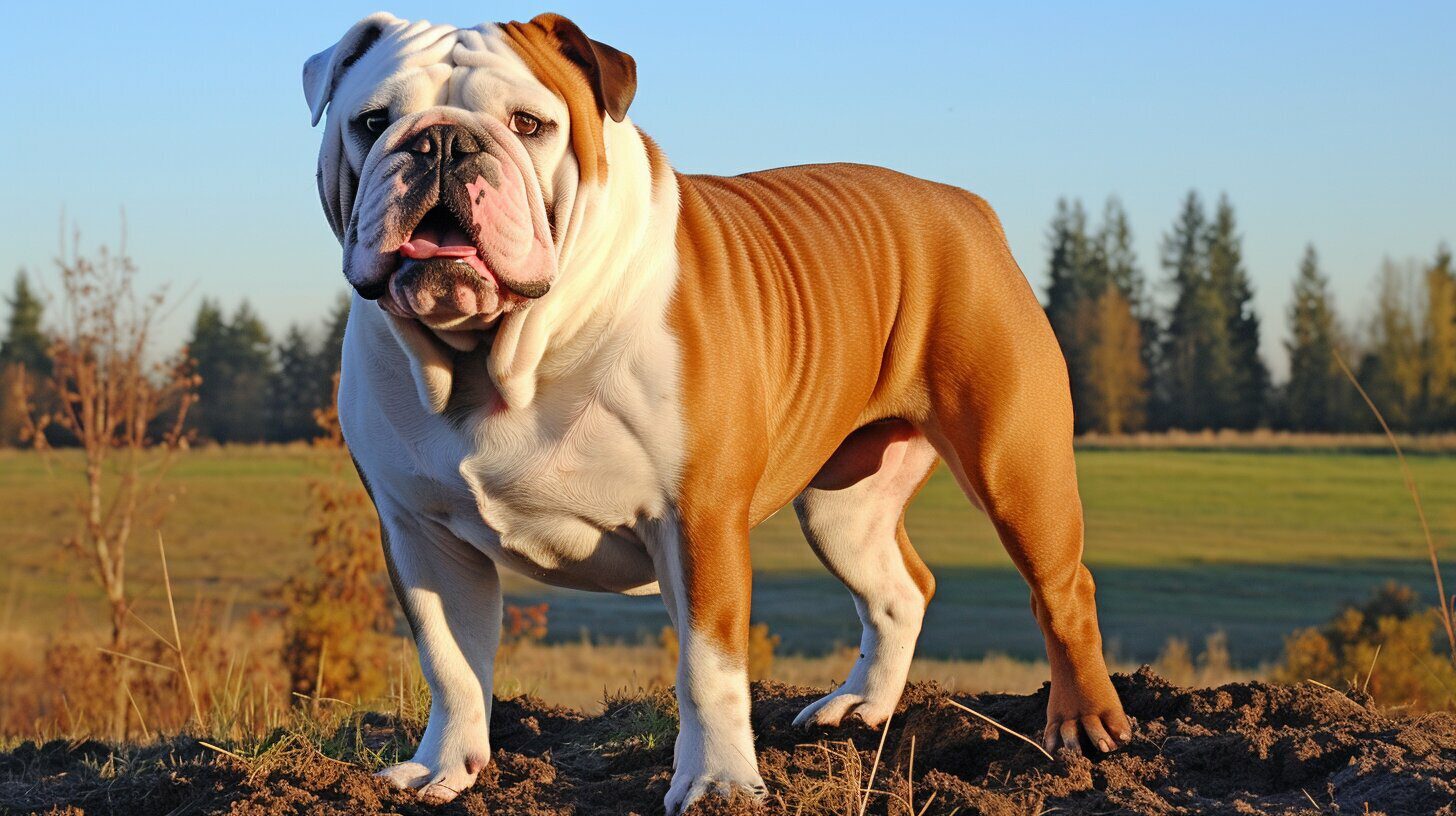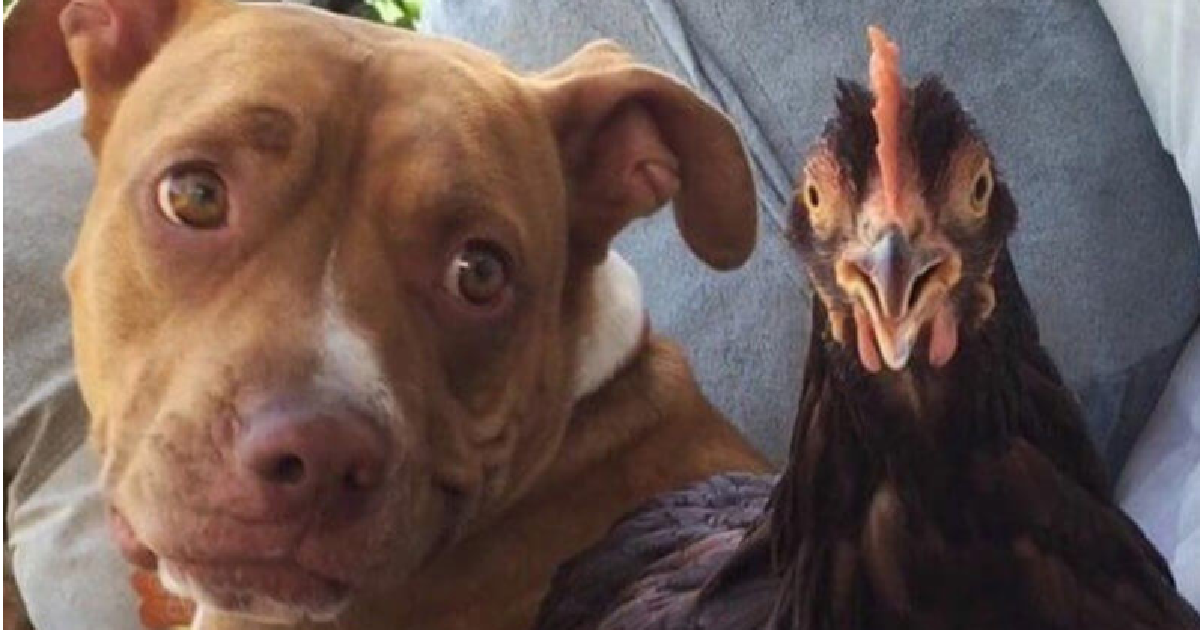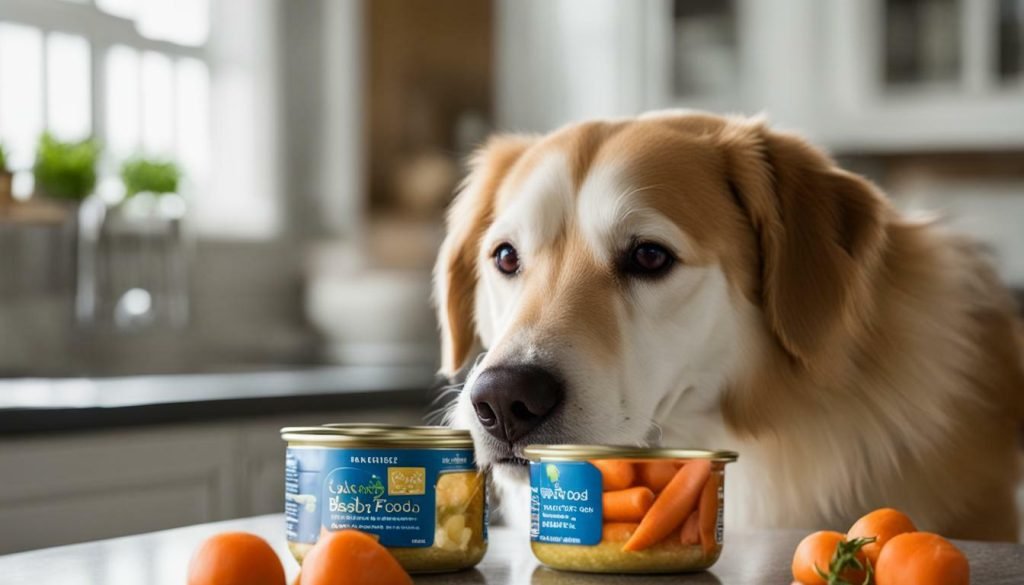
If you’ve ever wondered, “can dogs eat baby food?” you’re not alone. Many pet owners are curious about whether it’s safe to feed their furry friends this human food.
Key Takeaways:
- Baby food can be safe for dogs in moderation.
- It can be beneficial for dogs with certain health conditions or fussy eaters.
- It should not replace a balanced dog diet.
- Always consult with a veterinarian before introducing baby food to your dog.
- Avoid flavors that contain harmful ingredients like onions or garlic.
Baby Food and Dogs: Is It Safe?
When it comes to feeding baby food to your canine companion, safety is a top concern. Let’s explore whether baby food is safe for dogs and what precautions you should take.
Baby food can be given to dogs in small amounts and on occasion. It can be a convenient option for pet owners, especially for those with dogs who are picky eaters or have health conditions that require a softer diet. However, it’s essential to remember that baby food should never replace a balanced dog diet that is certified as “complete and balanced” for their specific life stage.
It’s crucial to consult with your veterinarian before feeding baby food to your dog, especially if they have any health concerns or dietary restrictions. Certain flavors of baby food may contain ingredients like onions or garlic, which can be harmful to dogs. Always check the labels and choose baby food that is free from any potentially toxic ingredients.
Feeding baby food to dogs should be done sparingly and as a treat or occasional addition to their regular diet. It can be a helpful tool for hiding medication or enticing a sick dog to eat. If you prefer to make homemade baby food for your dog, recipes using safe ingredients like pumpkin or sweet potatoes can be a nutritious and tasty option. However, it’s crucial to avoid toxic ingredients and seek veterinary advice if you have any concerns.
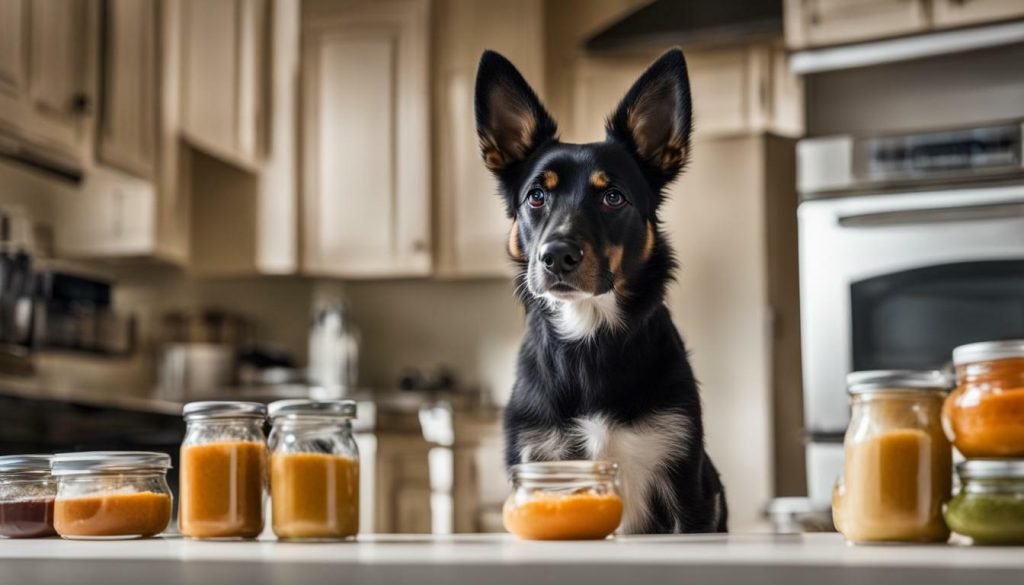
The Benefits of Feeding Baby Food to Dogs
Feeding baby food to dogs can offer several benefits, but it’s important to understand when and how to incorporate it into their diet for optimal results. Baby food can be a suitable option for dogs with certain health conditions or those who are picky eaters. It can entice them to eat and provide them with essential nutrients.
One of the main advantages of feeding baby food to dogs is its palatability. Baby food is often made with ingredients that dogs find appealing, such as meat, vegetables, and fruits. This can be particularly beneficial for dogs who are recovering from an illness or injury and may have lost their appetite. The taste and texture of baby food can stimulate their senses and encourage them to eat.
Additionally, baby food can be a convenient way to hide medication for dogs who are resistant to taking pills. Many medications can be safely mixed with baby food, enabling pet owners to administer the necessary medication without the struggle or stress of trying to give it directly. This can be especially helpful for dogs who require long-term medication or have chronic health conditions.
It’s worth noting that while baby food can provide these benefits, it should not replace a balanced dog diet. Baby food should only be given to dogs as an occasional treat or supplement, and the main part of their diet should consist of a high-quality dog food that is certified as “complete and balanced” for their specific life stage. It’s always recommended to consult with a veterinarian before introducing baby food into a dog’s diet, especially if the dog has any existing health concerns.
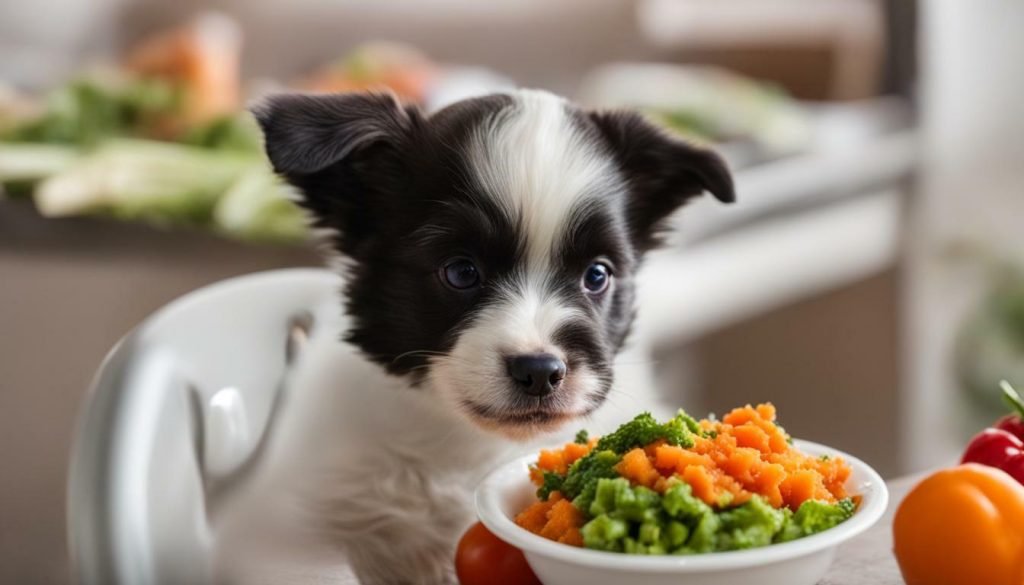
Dog Nutrition and Baby Food: What to Consider
When it comes to dog nutrition, a well-rounded diet is essential. Let’s explore how baby food fits into the overall nutritional needs of your furry friend.
Baby food can be a tempting option to offer your dog, especially if they are a picky eater or have specific health conditions. However, it’s important to remember that baby food should never replace a balanced dog diet that is certified as “complete and balanced” for their life stage. Baby food should only be given as an occasional treat or to entice a sick dog to eat.
Before incorporating baby food into your dog’s diet, it’s crucial to consult with your veterinarian, particularly if your dog has any underlying health concerns. They can provide guidance on whether baby food is suitable for your dog and recommend specific flavors or ingredients to avoid. Some baby food flavors may contain harmful ingredients like onions or garlic, which can be toxic to dogs.
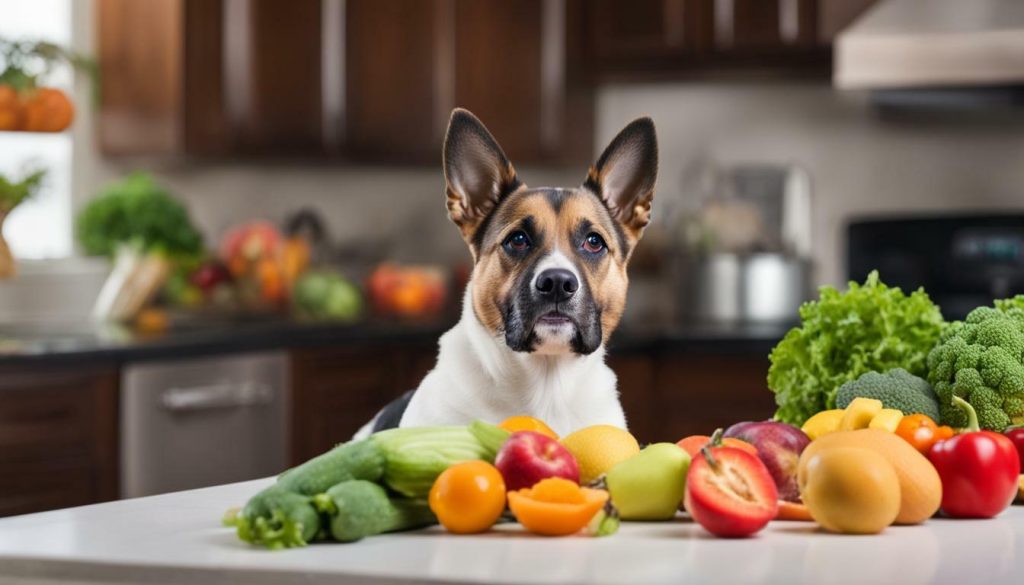
While commercial baby food options are readily available, you can also consider making homemade baby food for your dog. Homemade recipes can include dog-friendly ingredients like pumpkin or sweet potatoes, but it’s important to double-check with your veterinarian to ensure the ingredients are safe and suitable for your dog’s specific needs.
| Do’s | Don’ts |
|---|---|
|
|
Once your dog has recovered from any illness or injury and it’s time to transition them back to their regular dog food, it’s important to do so gradually. Sudden dietary changes can lead to digestive issues, so slowly mix in their regular food while reducing the amount of baby food over a period of several days.
Remember, a balanced and complete dog diet should always be the priority for your furry friend’s overall health and well-being. While baby food can provide some benefits in certain situations, it should never replace a nutritious and tailored diet specifically designed for dogs.
Choosing the Best Baby Food for Dogs
Not all baby foods are created equal when it comes to dogs, so here’s a guide to help you choose the best options for your four-legged companion. Baby food can be a convenient and tasty addition to your dog’s diet, but it’s important to select the right products to ensure their health and well-being.
| Considerations | Tips |
|---|---|
| Ingredients | Check the label to avoid baby foods that contain harmful ingredients like onions or garlic, which can be toxic to dogs. Opt for simple and natural flavors without added sugars or artificial additives. |
| Texture | Choose baby foods with a smooth texture, as large chunks or pieces may pose a choking hazard for dogs. It’s best to use purees or mashed baby foods that can be easily swallowed and digested. |
| Nutritional Value | Ensure the baby food provides essential nutrients for dogs. Look for options that include proteins, vitamins, and minerals. However, keep in mind that baby food should not replace your dog’s regular diet, as it may not offer the complete balance of nutrients they need. |
| Veterinary Advice | Consult your veterinarian before introducing baby food into your dog’s diet. They can provide guidance based on your dog’s specific needs and health conditions, ensuring that it is safe and appropriate for them. |
Remember, feeding baby food to dogs should be occasional and not a regular part of their diet. It can be used as a treat, a way to hide medication, or to entice a picky eater. If you’re unsure about the options available, there are specialized dog foods that mimic the flavors and textures of baby food, specifically formulated for canine nutrition.
By choosing the best baby food for your dog and incorporating it responsibly into their diet, you can provide them with variety and enjoyment while ensuring their overall health and well-being.
Image: 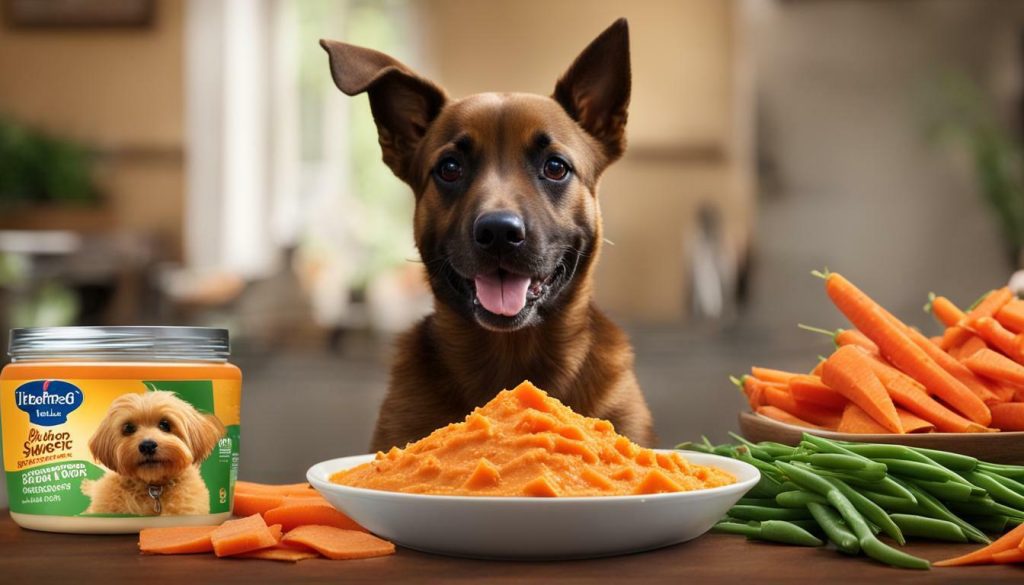
Introducing Baby Food to Dogs: Tips and Guidelines
Introducing baby food to your dog’s diet is a process that requires patience and careful monitoring. Here are some tips and guidelines to ensure a smooth transition.
- Start with small portions: Begin by offering your dog a small amount of baby food as a treat or to mix with their regular dog food. This allows them to get accustomed to the new taste and texture gradually.
- Monitor for any adverse reactions: Keep a close eye on your dog after introducing baby food into their diet. Look out for any signs of digestive upset, such as diarrhea or vomiting. If you notice any negative reactions, discontinue the use of baby food and consult with your veterinarian.
- Choose flavors wisely: Opt for baby food flavors that do not contain harmful ingredients like onions or garlic. Stick to plain and simple options such as sweet potato or pumpkin, which are generally safe for dogs.
- Use baby food as a tool: Baby food can be a useful tool to hide medication or entice a fussy eater to eat. However, it should not replace a balanced dog diet. The main food should be certified as “complete and balanced” for your dog’s specific life stage.
Remember, feeding baby food to your dog should be occasional and not a regular part of their diet. It can be used as a treat, to help a sick dog regain their appetite, or during special circumstances. It’s always important to consult with your veterinarian before making any significant changes to your dog’s diet.
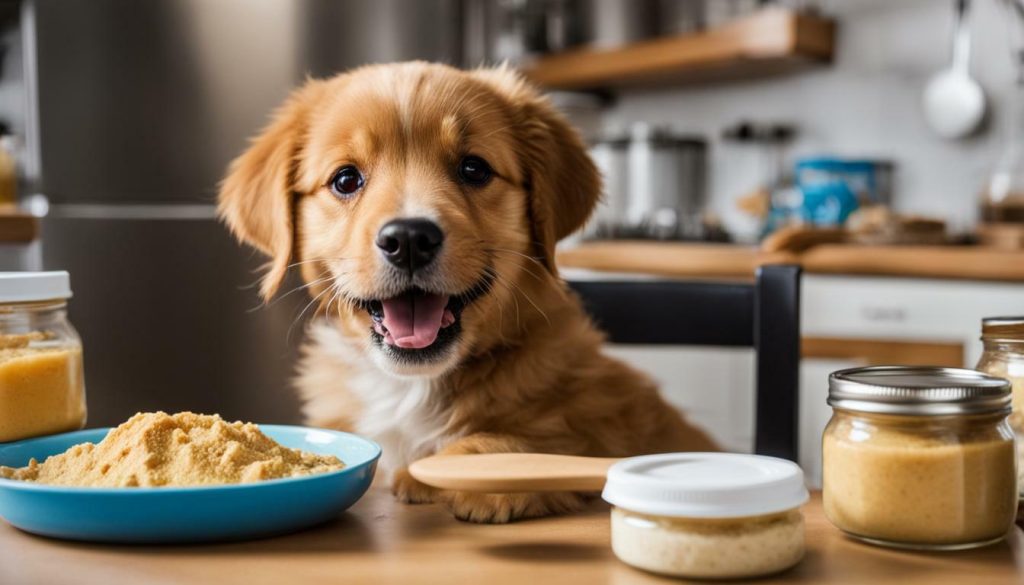
By following these tips and guidelines, you can introduce baby food to your dog’s diet in a safe and controlled manner. However, it’s essential to exercise caution and prioritize your dog’s overall health and nutritional needs. If you have any concerns or questions, consult with your veterinarian for personalized advice.
Homemade Baby Food for Dogs: DIY Delights
If you’re feeling adventurous or prefer a more personalized approach, here are some homemade baby food recipes that will have your dog’s tail wagging with joy. Making your own dog-friendly baby food is a great way to ensure your furry friend gets all the nutrients they need without any harmful ingredients. Remember to consult with your veterinarian before introducing any new foods into your dog’s diet, especially if they have specific health concerns or dietary restrictions.
Pumpkin and Peanut Butter Puree
This tasty and nutritious recipe is perfect for dogs who need a little extra fiber in their diet. Simply combine one cup of cooked and mashed pumpkin with two tablespoons of unsalted, natural peanut butter. Mix well and serve a spoonful as a special treat or use it to stuff a Kong toy for some extra mental stimulation.
Sweet Potato and Chicken Mash
This recipe is a hit with dogs who crave a savory and slightly sweet flavor. Start by boiling and mashing one small sweet potato. In a separate pan, cook and shred a small portion of boneless, skinless chicken breast. Once both ingredients are ready, mix them together and serve as a meal topper or a standalone dish for your pup’s delight.
Spinach and Blueberry Smoothie
This refreshing and antioxidant-rich smoothie is a great way to sneak some leafy greens into your dog’s diet. Blend one cup of fresh spinach with a handful of blueberries and a little water until smooth. Pour the mixture into an ice cube tray and freeze. Serve a cube or two as a cool treat on hot summer days or add them to your dog’s water bowl for a flavorful twist.
| Recipe | Ingredients | Instructions |
|---|---|---|
| Pumpkin and Peanut Butter Puree | 1 cup cooked and mashed pumpkin, 2 tablespoons unsalted natural peanut butter | 1. Combine pumpkin and peanut butter 2. Mix well 3. Serve as a treat or stuff in a Kong toy |
| Sweet Potato and Chicken Mash | 1 small sweet potato, boneless skinless chicken breast | 1. Boil and mash sweet potato 2. Cook and shred chicken breast 3. Mix ingredients together 4. Serve as a meal topper or standalone dish |
| Spinach and Blueberry Smoothie | 1 cup fresh spinach, handful of blueberries, water | 1. Blend spinach and blueberries with water until smooth 2. Pour mixture into ice cube tray and freeze 3. Serve as a treat or add to water bowl |
Remember, these homemade baby food recipes should only be given to your dog as an occasional treat or supplement to their regular diet. It’s important to maintain a balanced and complete dog diet by feeding them high-quality dog food that is certified as “complete and balanced” for their life stage. If you have any concerns or questions about your dog’s diet, always consult with your veterinarian for professional advice.
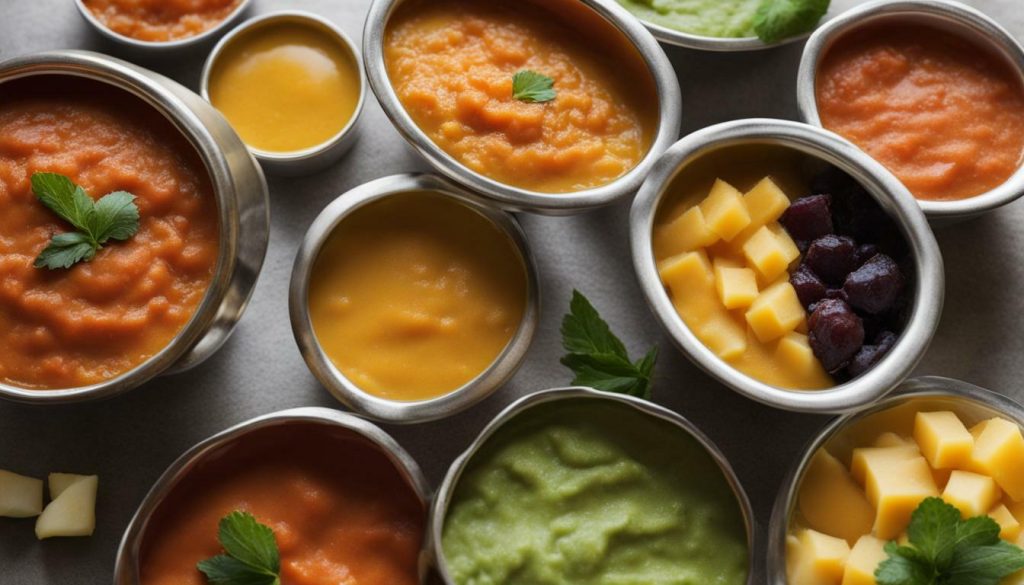
Serving baby food to your dog can be a rewarding experience, but it’s crucial to follow certain guidelines to ensure their safety and well-being. Baby food can be a great supplement to a dog’s diet, but it should never replace their main food, which should be certified as “complete and balanced” for their specific life stage. Here are some dos and don’ts when it comes to serving baby food to your furry friend:
Do:
- Consult with your veterinarian: Before introducing baby food into your dog’s diet, it’s important to consult with your veterinarian. They can provide guidance on appropriate flavors, portion sizes, and any specific dietary considerations for your dog’s health.
- Choose baby food flavors without harmful ingredients: Opt for baby food flavors that do not contain harmful ingredients like onions or garlic. These ingredients can be toxic to dogs and should be avoided.
- Use baby food as a treat or for special purposes: Baby food can be used as a special treat or to entice a fussy eater. It can also be helpful for hiding medication or assisting a sick dog in regaining their appetite.
- Consider homemade baby food recipes: If you prefer to make your own baby food for your dog, it’s essential to use dog-friendly ingredients and avoid any toxic substances. Homemade baby food recipes can include ingredients like pumpkin or sweet potatoes, which are generally safe and healthy for dogs.
Don’t:
- Overfeed with baby food: Baby food should only be given to dogs in moderation. It’s important to remember that baby food is not nutritionally complete or balanced for a dog’s needs. Feeding too much baby food can lead to nutrient imbalances or upset stomachs.
- Use baby food as the sole source of nutrition: Baby food should never be the sole source of nutrition for your dog. It lacks the necessary nutrients required for their overall health and well-being. Always ensure that your dog’s main food is specifically designed for their life stage and meets their nutritional needs.
- Ignore any health concerns: If your dog has any pre-existing health conditions or concerns, it’s vital to consult with your veterinarian before adding baby food to their diet. They can provide guidance on whether it’s safe and appropriate for your dog’s specific health needs.
- Rapidly transition back to regular dog food: If you’ve incorporated baby food into your dog’s diet for a specific purpose, such as recovering from illness or injury, it’s crucial to transition them back to their regular dog food gradually. Sudden changes in diet can lead to digestive issues, so it’s best to make the transition slowly over a few days.
Remember, serving baby food to your dog should be a supplement or occasional treat, not a regular part of their diet. Always prioritize their overall nutrition and consult with your veterinarian for personalized advice.
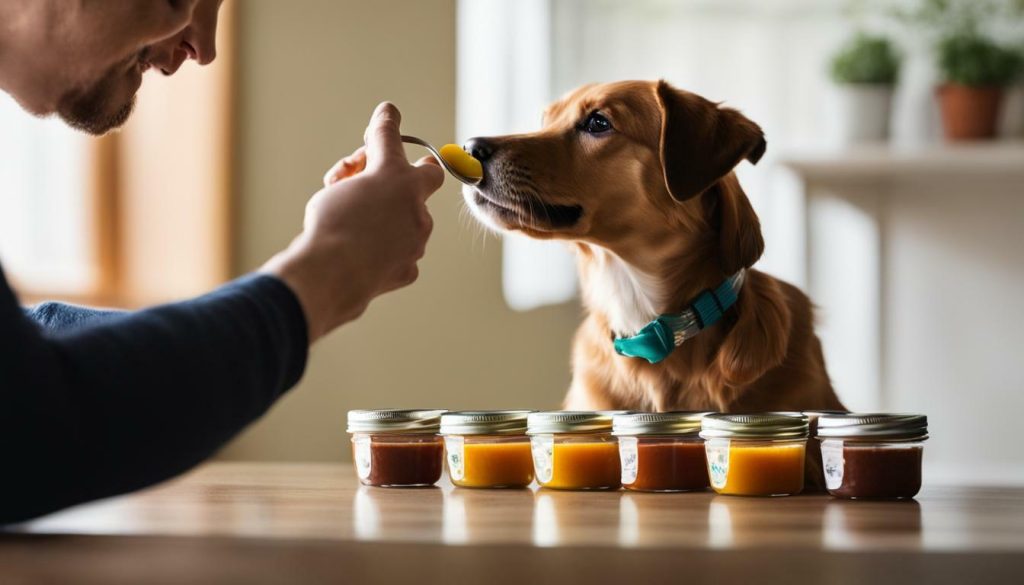
| Dos | Don’ts |
|---|---|
| Consult with your veterinarian | Overfeed with baby food |
| Choose baby food flavors without harmful ingredients | Use baby food as the sole source of nutrition |
| Use baby food as a treat or for special purposes | Ignore any health concerns |
| Consider homemade baby food recipes | Rapidly transition back to regular dog food |
Transitioning Back to Regular Dog Food
Once your dog has recovered from an illness or injury and the need for baby food diminishes, it’s essential to transition them back to their regular dog food gradually. Abruptly changing their diet can lead to digestive upset, so a gradual transition is best for their health and well-being.
Start by mixing a small amount of their regular dog food with baby food. Begin with a ratio of 75% baby food to 25% regular dog food, and gradually increase the amount of regular dog food while decreasing the baby food over the course of several days. Monitor their digestion during this transition period, ensuring they are tolerating the change well.
It’s important to note that baby food should not become a permanent part of your dog’s diet. While it can be beneficial in certain situations, such as when a dog is sick or needs to regain their appetite, it should always be used as a temporary solution. A balanced and complete dog food that is appropriate for their life stage should make up the majority of their diet.
Table: Transitioning Back to Regular Dog Food
| Day | Ratio of Baby Food to Regular Dog Food |
|---|---|
| Day 1 | 75% baby food, 25% regular dog food |
| Day 2 | 50% baby food, 50% regular dog food |
| Day 3 | 25% baby food, 75% regular dog food |
| Day 4 | 100% regular dog food |
By following this gradual transition process, you can ensure that your dog’s digestive system adjusts smoothly to the change in diet. If you have any concerns or your dog experiences any digestive issues during the transition, it’s always best to consult with your veterinarian.
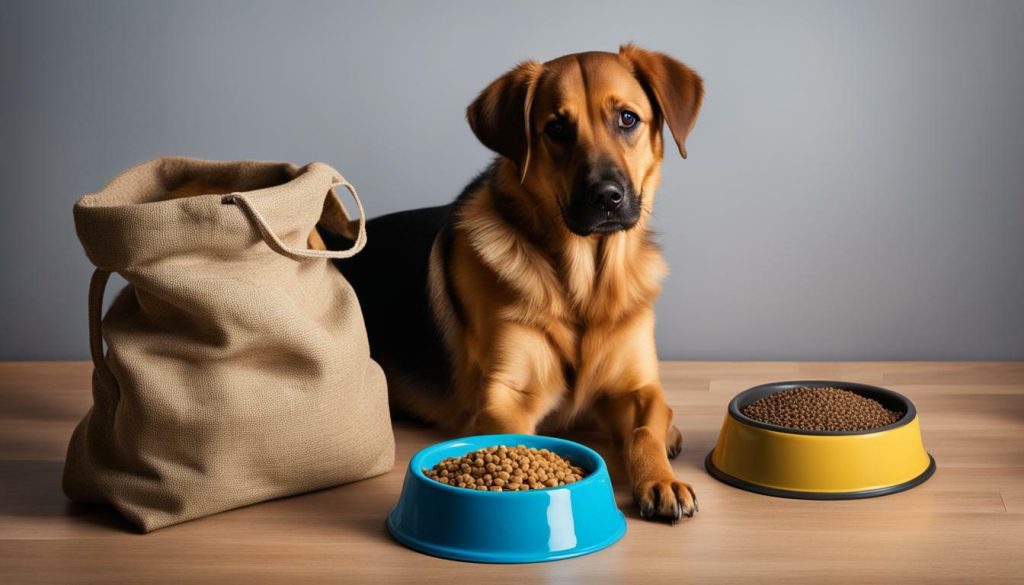
After exploring the safety, benefits, and considerations surrounding baby food for dogs, it’s clear that it can be a safe and useful addition to their diet when used appropriately.
It’s important to remember that baby food should only be given to dogs in moderation. While it can be a good choice for dogs with certain health conditions or to entice a picky eater, it should not be a substitute for a balanced dog diet. The main food given to dogs should be certified as “complete and balanced” for their specific life stage.
Before incorporating baby food into a dog’s diet, it’s crucial to check with a veterinarian, especially if the dog has any underlying health concerns. The veterinarian can provide guidance on suitable flavors and ensure that the baby food does not contain harmful ingredients like onions or garlic.
Feeding baby food to dogs should be occasional and not a regular part of their diet. It can be used as a special treat, to hide medication, or to help a sick dog regain their appetite. Homemade baby food recipes for dogs can also be made using ingredients like pumpkin or sweet potatoes, but it’s essential to avoid toxic ingredients and seek veterinary advice if there are any concerns.
When transitioning a dog back to their regular dog food after incorporating baby food for a specific purpose, it’s important to do so gradually. This gradual transition helps prevent any digestive issues and allows the dog’s system to readjust to their usual diet.
In conclusion, with careful consideration and veterinary guidance, baby food can be a safe and beneficial addition to a dog’s diet. However, it should always be used in moderation and should not replace a balanced dog food that is specifically formulated for their nutritional needs.
FAQ
Can dogs eat baby food?
Yes, dogs can eat baby food, but it should only be given in moderation.
Is baby food safe for dogs?
Baby food is generally safe for dogs to eat, but it should not be a substitute for a balanced dog diet.
What are the benefits of feeding baby food to dogs?
Baby food can be a good choice for dogs with certain health conditions or to entice a fussy eater to eat.
What should I consider about dog nutrition and baby food?
Baby food should complement a dog’s diet, and the main food should be certified as “complete and balanced” for the dog’s life stage.
How can I choose the best baby food for dogs?
When choosing baby food for dogs, it’s important to check labels for harmful ingredients and select flavors that meet a dog’s dietary requirements.
How do I introduce baby food to my dog?
Introduce baby food gradually, monitor for any adverse reactions, and consider portion sizes according to your dog’s size and needs.
Can I make homemade baby food for my dog?
Yes, homemade baby food recipes for dogs can be made using ingredients like pumpkin or sweet potatoes, but avoid toxic ingredients and seek veterinary advice if necessary.
Are there any guidelines for serving baby food to dogs?
Serve baby food to dogs in moderation, use it as a treat, to hide medication, or to help a sick dog regain their appetite, and avoid over-reliance on baby food as a regular part of their diet.
How do I transition my dog back to regular dog food?
Transition a dog back to regular dog food gradually after they have recovered from illness or injury to avoid digestive issues.
Can dogs eat baby food as their main diet?
No, baby food should not be the main diet for dogs. It should be used occasionally and in moderation, with the main food being certified as “complete and balanced” for the dog’s life stage.



